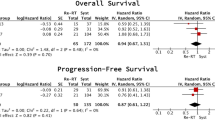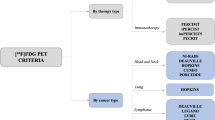Abstract
Introduction
This study aimed to investigate whether systemic therapy (ST) use surrounding radiation therapy (RT) predicts overall survival (OS) after RT for patients with brain metastases (BMs).
Methods
Provincial RT and pharmacy databases were used to review all adult patients in British Columbia, Canada, who received a first course of RT for BMs between 2012 and 2016 (n = 3095). Multivariate analysis on a randomly selected subset was used to develop an OS nomogram.
Results
In comparison to the 2096 non-recipients of ST after RT, the median OS of the 999 recipients of ST after RT was 5.0 (95% Confidence interval (CI) 4.1–6.0) months longer (p < 0.0001). Some types of ST after RT were independently predictive of OS: targeted therapy (hazard ratio (HR) 0.42, CI 0.37–0.48), hormone therapy (HR 0.45, CI 0.36–0.55), cytotoxic chemotherapy (HR 0.71, CI 0.64–0.79), and immunotherapy (HR 0.64, CI 0.37–1.06). Patients who discontinued ST after RT had 0.9 (CI 0.3–1.4) months shorter median OS than patients who received no ST before or after RT (p < 0.0001). In the multivariate analysis of the 220-patient subset, established prognostic variables (extracranial disease, performance status, age, cancer diagnosis, and number of BMs), and the novel variables “ST before RT” and “Type of ST after RT” independently predicted OS. The nomogram predicted 6- and 12-month OS probability and median OS (bootstrap-corrected Harrell’s Concordance Index = 0.70).
Conclusions
The type and timing of ST use surrounding RT predict OS for patients with BMs.


Similar content being viewed by others
References
Bast RC (2016) Holland-Frei cancer medicine, 9th edn. John Wiley & Sons Inc, Hoboken
Boire A, Brastianos PK, Garzia L, Valiente M (2020) Brain metastasis. Nat Rev Cancer 20:4–11. https://doi.org/10.1038/s41568-019-0220-y
Valiente M, Ahluwalia MS, Boire A et al (2018) The evolving landscape of brain metastasis. Trends Cancer 4:176–196. https://doi.org/10.1016/j.trecan.2018.01.003
Mulvenna P, Nankivell M, Barton R et al (2016) Dexamethasone and supportive care with or without whole brain radiotherapy in treating patients with non-small cell lung cancer with brain metastases unsuitable for resection or stereotactic radiotherapy (QUARTZ): results from a phase 3, non-inferiority, randomised trial. Lancet 388:2004–2014. https://doi.org/10.1016/S0140-6736(16)30825-X
Lu-Emerson C, Eichler AF (2012) Brain metastases. Continuum (Minneap Minn) 18:295–311. https://doi.org/10.1212/01.CON.0000413659.12304.a6
Sperduto PW, Chao ST, Sneed PK et al (2010) Diagnosis-specific prognostic factors, indexes, and treatment outcomes for patients with newly diagnosed brain metastases: a multi-institutional analysis of 4,259 patients. Int J Radiat Oncol Biol Phys 77:655–661. https://doi.org/10.1016/j.ijrobp.2009.08.025
Brown PD, Ahluwalia MS, Khan OH et al (2018) Whole-brain radiotherapy for brain metastases: evolution or revolution? J Clin Oncol 36:483–491. https://doi.org/10.1200/JCO.2017.75.9589
Patchell RA, Tibbs PA, Walsh JW et al (1990) A randomized trial of surgery in the treatment of single metastases to the brain. N Engl J Med 322:494–500. https://doi.org/10.1056/NEJM199002223220802
Soria J-C, Ohe Y, Vansteenkiste J et al (2018) Osimertinib in untreated EGFR -mutated advanced non–small-cell lung cancer. N Engl J Med 378:113–125. https://doi.org/10.1056/NEJMoa1713137
Murthy RK, Loi S, Okines A et al (2020) Tucatinib, trastuzumab, and capecitabine for HER2-positive metastatic breast cancer. N Engl J Med 382:597–609. https://doi.org/10.1056/NEJMoa1914609
Robert C, Grob JJ, Stroyakovskiy D et al (2019) Five-year outcomes with dabrafenib plus trametinib in metastatic melanoma. N Engl J Med 381:626–636. https://doi.org/10.1056/NEJMoa1904059
Ahn M-J, Kim D-W, Cho BC et al (2017) Activity and safety of AZD3759 in EGFR-mutant non-small-cell lung cancer with CNS metastases (BLOOM): a phase 1, open-label, dose-escalation and dose-expansion study. Lancet Respir Med 5:891–902. https://doi.org/10.1016/S2213-2600(17)30378-8
Berghoff AS, Venur VA, Preusser M, Ahluwalia MS (2016) Immune checkpoint inhibitors in brain metastases: from biology to treatment. Am Soc Clin Oncol Educ Book Am Soc Clin Oncol Annu Meet 35:e116-122. https://doi.org/10.1200/EDBK_100005
Goldberg SB, Gettinger SN, Mahajan A et al (2016) Pembrolizumab for patients with melanoma or non-small-cell lung cancer and untreated brain metastases: early analysis of a non-randomised, open-label, phase 2 trial. Lancet Oncol 17:976–983. https://doi.org/10.1016/S1470-2045(16)30053-5
Margolin K, Ernstoff MS, Hamid O et al (2012) Ipilimumab in patients with melanoma and brain metastases: an open-label, phase 2 trial. Lancet Oncol 13:459–465. https://doi.org/10.1016/S1470-2045(12)70090-6
Agarwal JP, Chakraborty S, Laskar SG et al (2018) Applying the QUARTZ trial results in clinical practice: development of a prognostic model predicting poor outcomes for Non-small cell lung cancers with brain metastases. Clin Oncol 30:382–390. https://doi.org/10.1016/j.clon.2018.02.002
Ahn HK, Lee S, Park YH et al (2012) Prediction of outcomes for patients with brain parenchymal metastases from breast cancer (BC): a new BC-specific prognostic model and a nomogram. Neuro-Oncol 14:1105–1113. https://doi.org/10.1093/neuonc/nos137
Barnholtz-Sloan JS, Yu C, Sloan AE et al (2012) A nomogram for individualized estimation of survival among patients with brain metastasis. Neuro-Oncol 14:910–918. https://doi.org/10.1093/neuonc/nos087
Lagerwaard F, Levendag P, Nowak PC et al (1999) Identification of prognostic factors in patients with brain metastases: a review of 1292 patients. Int J Radiat Oncol Biol Phys 43:795–803. https://doi.org/10.1016/S0360-3016(98)00442-8
Lorenzoni J, Devriendt D, Massager N et al (2004) Radiosurgery for treatment of brain metastases: estimation of patient eligibility using three stratification systems. Int J Radiat Oncol Biol Phys 60:218–224. https://doi.org/10.1016/j.ijrobp.2004.02.017
Rades D, Dunst J, Schild SE (2008) A new scoring system to predicting the survival of patients treated with whole-brain radiotherapy for brain metastases. Strahlenther Onkol 184:251–255. https://doi.org/10.1007/s00066-008-1831-5
Sperduto PW, Berkey B, Gaspar LE et al (2008) A new prognostic index and comparison to three other indices for patients with brain metastases: an analysis of 1,960 patients in the RTOG database. Int J Radiat Oncol Biol Phys 70:510–514. https://doi.org/10.1016/j.ijrobp.2007.06.074
Sperduto PW, Deegan BJ, Li J et al (2018) Estimating survival for renal cell carcinoma patients with brain metastases: an update of the renal graded prognostic assessment tool. Neuro-Oncol 20:1652–1660. https://doi.org/10.1093/neuonc/noy099
Sperduto PW, Fang P, Li J et al (2019) Estimating survival in patients with gastrointestinal cancers and brain metastases: an update of the graded prognostic assessment for gastrointestinal cancers (GI-GPA). Clin Transl Radiat Oncol 18:39–45. https://doi.org/10.1016/j.ctro.2019.06.007
Sperduto PW, Mesko S, Li J et al (2020) Beyond an updated graded prognostic assessment (Breast GPA): a prognostic index and trends in treatment and survival in breast cancer brain metastases from 1985 to today. Int J Radiat Oncol Biol Phys. https://doi.org/10.1016/j.ijrobp.2020.01.051
Sperduto PW, Jiang W, Brown PD et al (2017) Estimating survival in melanoma patients with brain metastases: an update of the graded prognostic assessment for melanoma using molecular markers (melanoma-molGPA). Int J Radiat Oncol Biol Phys 99:812–816. https://doi.org/10.1016/j.ijrobp.2017.06.2454
Sperduto PW, Yang TJ, Beal K et al (2017) Estimating survival in patients with lung cancer and brain metastases: an update of the graded prognostic assessment for lung cancer using molecular markers (lung-molGPA). JAMA Oncol 3:827. https://doi.org/10.1001/jamaoncol.2016.3834
Weltman E, Salvajoli JV, Brandt RA et al (2000) Radiosurgery for brain metastases: a score index for predicting prognosis. Int J Radiat Oncol Biol Phys 46:1155–1161. https://doi.org/10.1016/S0360-3016(99)00549-0
Zindler JD, Jochems A, Lagerwaard FJ et al (2017) Individualized early death and long-term survival prediction after stereotactic radiosurgery for brain metastases of non-small cell lung cancer: two externally validated nomograms. Radiother Oncol 123:189–194. https://doi.org/10.1016/j.radonc.2017.02.006
Gaspar L, Scott C, Rotman M et al (1997) Recursive partitioning analysis (RPA) of prognostic factors in three Radiation Therapy Oncology Group (RTOG) brain metastases trials. Int J Radiat Oncol Biol Phys 37:745–751. https://doi.org/10.1016/s0360-3016(96)00619-0
Huang Z, Sun B, Wu S et al (2018) A nomogram for predicting survival in patients with breast cancer brain metastasis. Oncol Lett 15:7090–7096. https://doi.org/10.3892/ol.2018.8259
Nieder C, Marienhagen K, Dalhaug A, et al (2014) Impact of systemic treatment on survival after whole brain radiotherapy in patients with brain metastases. Med Oncol 31:927. https://doi.org/10.1007/s12032-014-0927-2
Yao Z, Zheng Z, Ke W et al (2019) Prognostic nomogram for bladder cancer with brain metastases: a National Cancer Database analysis. J Transl Med 17:411. https://doi.org/10.1186/s12967-019-2109-7
Liu H, Xu Y, Guo C et al (2019) Predictive value of a nomogram for melanomas with brain metastases at initial diagnosis. Cancer Med 8:7577–7585. https://doi.org/10.1002/cam4.2644
Zhao L, Cai X, Chen D et al (2020) Therapeutic effect of whole brain radiotherapy on advanced NSCLC between EGFR TKI-naïve and TKI-resistant. Radiat Oncol 15(1):3. https://doi.org/10.1186/s13014-019-1454-2
Aoyama H, Tago M, Shirato H (2015) Stereotactic radiosurgery with or without whole-brain radiotherapy for brain metastases: secondary analysis of the JROSG 99–1 randomized clinical trial. JAMA Oncol 1:457. https://doi.org/10.1001/jamaoncol.2015.1145
Kocher M, Soffietti R, Abacioglu U et al (2011) Adjuvant whole-brain radiotherapy versus observation after radiosurgery or surgical resection of one to three cerebral metastases: results of the EORTC 22952–26001 study. J Clin Oncol 29:134–141. https://doi.org/10.1200/JCO.2010.30.1655
Patchell RA, Tibbs PA, Regine WF, et al (1998) Postoperative radiotherapy in the treatment of single metastases to the brain: a randomized trial. JAMA 280:1485–1489. https://doi.org/10.1001/jama.280.17.1485
Rice SR, Bentzen SM, Hanna A et al (2018) Prognostic models for patients with brain metastases after stereotactic radiosurgery with or without whole brain radiotherapy: a validation study. J Neurooncol 140:341–349. https://doi.org/10.1007/s11060-018-2958-6
Author information
Authors and Affiliations
Contributions
Study conception and design: KF, LG and AN; Data acquisition: KF and KW; Analysis and interpretation of data: KF, NLa, NLe, AK, FH, LG and AN. All authors contributed to drafting the manuscript, approved the final version and agreed to be accountable for all aspects of the work.
Corresponding author
Ethics declarations
Ethical approval
This study was approved by the University of British Columbia – BC Cancer Research Ethics Board (H19-02273).
Conflict of interest
Nathalie LeVasseur declares advisory roles for Pfizer, Novartis, Tersera, Roche, and Genomic health, and research funding from Genomic Health and Abbvie. Alan Nichol declares research funding from Varian Medical Systems Ltd. The other authors have no conflicts of interest to declare.
Additional information
Publisher's Note
Springer Nature remains neutral with regard to jurisdictional claims in published maps and institutional affiliations.
Electronic supplementary material
Below is the link to the electronic supplementary material.
Rights and permissions
About this article
Cite this article
Fan, K.Y., Lalani, N., LeVasseur, N. et al. Type and timing of systemic therapy use predict overall survival for patients with brain metastases treated with radiation therapy. J Neurooncol 151, 231–240 (2021). https://doi.org/10.1007/s11060-020-03657-8
Received:
Accepted:
Published:
Issue Date:
DOI: https://doi.org/10.1007/s11060-020-03657-8




